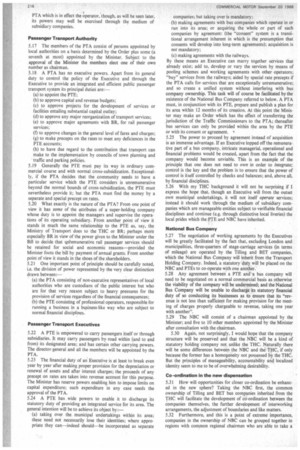Passenger Transport Executives 5.22 A PTE is empowered to carry
Page 220

If you've noticed an error in this article please click here to report it so we can fix it.
passengers itself or through subsidiaries. It may carry passengers by road within (and to and from) its designated area; and has certain other carrying powers. The director-general and all the members will be appointed by the PTA.
5.23 The financial duty of an Executive is at least to break even year by year after making proper provision for the depreciation or renewal of assets and after interest charges; the proceeds of any precept on rates are taken into revenue account for this purpose. The Minister has reserve powers enabling him to impose limits on capital expenditure; such expenditure in any case needs the approval of the PTA.
5.24 A PTE has wide powers to enable it to discharge its statutory duty of providing an integrated service for its area. The general intention will be to achieve its object by:—
(a) taking over the municipal undertakings within its area; these need not necessarily lose their identities; where appropriate they can—indeed should—he incorporated as separate companies; but taking over is mandatory;
(b) making agreements with bus companies which operate in or run into its area; or acquiring the whole or part of such companies by agreement: (the "consent" system is a transitional arrangement inherent in which is the presumption that consents will develop into long-term agreements): acquisition is not mandatory;
(c) making agreements with the railways.
By these means an Executive can marry together services that already exist; add to, develop or vary the services by means of pooling schemes and working agreements with other operators; "buy" services from the railways; aided by special rate precepts if the PTA calls forservices that are exceptionally unremunerative; and so create a unified system without interfering with bus company ownership. This task will of course be facilitated by the existence of the National Bus Company referred to below. A PTA must, in conjunction with its PTE, prepare and publish a plan for its area within 12 months of its creation. At this point the Minister may make an Order which has the effect of transferring the jurisdiction of the Traffic Commissioners to the PTA; thereafter bus services can only be provided within the area by the PTE or with its consent or agreement.
5.25 The power to proceed by agreement instead of acquisition is an immense advantage. If an Executive lopped off the remunerative part of a bus company, intricate managerial, operational and financial problems would be created, apart from the fact that the company would become unviable. This is an example of the principle that one does not need to own in order to integrate; control is the key and the problem is to ensure that the power of control is itself controlled by checks and balances; and, above all, by financial disciplines.
5.26 With my THC background it will not be surprising if I express the hope that, though an Executive will from the outset own municipal undertakings, it will not itself operate services; instead it should work through the medium of subsidiary companies which are manageable entities subject to verifiable financial disciplines and continue (e.g. through distinctive local liveries) the local prides which the p.m and NBC have inherited.


















































































































































































































































































































































































